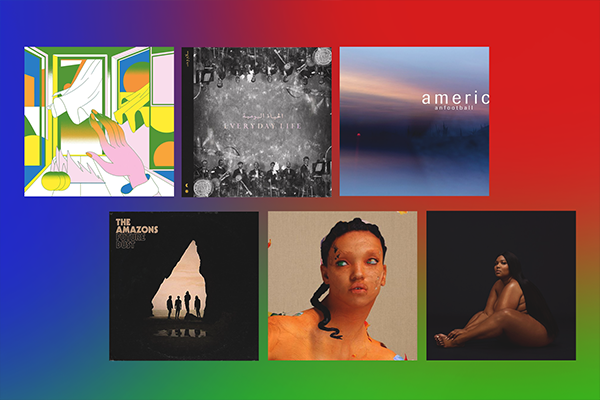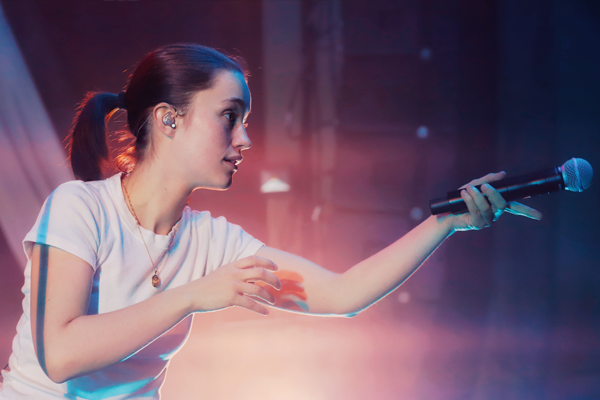FEATURE:
BACK TO THE FUTURE OF MUSIC
We review the last decade in music, and make predictions about what could come next.

Photo: Paul McCartney, via YouTube
100 years ago, the likes of Louis Armstrong and Jelly Roll Morton helped to kick off the Jazz Age in the United States. The genre went on to define popular culture for the next two decades, and influence it for many more. As it’s been a century since one of the most important decades in music, I thought I’d take a look at where the art form might be headed over the next ten years.
Artificial intelligence truly entered the public consciousness for the first time in the 2010s. From personal assistants to thermostats, AI changed our everyday lives in ways we might not have even been aware of. It hasn’t passed the music industry by either - for example, the streaming service Pandora boasts an incredibly sophisticated system that analyses the listening habits of its 65 million users to give personalised song recommendations. But what about AI’s creative abilities?
While it wasn’t much of a commercial success, the release of Holly Herndon’s 2019 album 'PROTO' was a landmark moment for AI-driven music. Written in collaboration with a program known as Spawn, the record combines traditional choirs with unorthodox musical textures to create a fascinatingly alien listening experience. As one of the first commercial records to utilise the potential of AI, PROTO’s title is fitting. It implies that the revolution’s just getting started.
As technology continues to advance, there’s a feeling that it’s only a matter of time before AI breaks into the charts. We might have to wait until the 2030s or beyond for a completely artificial number 1 hit, but AI-created beats, chord progressions and melodies are all on the verge of popular usage by artists looking to augment their natural abilities. Don’t be surprised if you see them adding AI to their arsenal over the next ten years.

One of the most significant changes to society in the 2010s was the rise of smartphones and social media, so it’s only natural that their influences began to show themselves in the music industry. Ridiculous as it might sound, memes had an undeniable impact on pop music charts in the latter half of the 2010s. Tracks such as Lil Nas X’s ‘Old Town Road’ and Drake’s ‘Hotline Bling’ have benefitted hugely from heavy use in internet meme culture.
It’s easy to imagine this trend continuing into the 2020s. Already this year we’ve seen Roddy Ricch’s ‘The Box’ winning a chart battle with Justin Bieber's 'Yummy' to top the Billboard Hot 100, thanks in no small part to scores of TikTok videos that feature the track. An album track from a relative newcomer beating out the comeback single from one of the biggest names in pop is symbolic of how music promotion is changing. It shows (not for the first time) that virality can out-perform a more traditional - and expensive - marketing campaign. Having millions of people promoting your music for free is the dream of every artist and label. It begs the question: Is it possible to manufacture virality? I have a feeling we’ll have an answer by the decade’s end.

Regardless of whether or not you’ve heard any of their music, chances are that if you have a Twitter account, you’ve had experience with the passionate fanbase of the Korean boy band BTS. Their popularity is ever-increasing in the west, but as with most boy bands, it’s still a fairly niche scene in the grand scheme of things. Nevertheless, it’s easy to see the appeal - whether it’s the catchy melodies, the meticulously crafted choreography, the memorable music videos, or a combination of all three and more, they offer something truly fresh to the western listener.
In the internet age, geographical borders are becoming increasingly irrelevant when it comes to music, and there’s perhaps no better example of that than BTS. They’ve broken down cultural barriers in a way that simply wouldn’t have been possible 20 years ago, and I could easily see other non-English speaking acts following in their footsteps in the new decade.

In 2017, hip-hop overtook rock as the best-selling genre in the USA. Many would have you believe this was the final nail in the coffin for a genre that had become increasingly bereft of new ideas over the years. However, it wasn’t the first time the music press had sounded the death knell for rock music.
At the turn of the millennium, there was a similar feeling. Britpop was on its way out, the Spice Girls were on their way in, and it looked like guitar music would soon be a thing of the past. Then, in 2001, The Strokes released their critically-acclaimed debut ‘Is This It’, and the genre changed forever. Sure, their sound wasn’t particularly innovative, but their brand of infectious, danceable indie rock was a breath of fresh air after the moody grunge movement of the 90s. Indeed, many critics credit ‘Is This It’ with single-handedly reviving the western rock scene. Maybe all we need is a modern equivalent.
That’s not to say there’s no innovation in modern rock, however. Black Midi’s ‘Schlagenheim’, for example, is an album that was filled with enough new sounds and ideas to earn it a Mercury Prize nomination. But to bring new life to an entire genre, a record needs to win the hearts of the general public as well as the critics - something that ‘Schlagenheim’ failed to achieve, only reaching number 42 in the band’s native UK before dropping off the charts altogether. Black Midi showed us there’s still plenty of room for creativity in rock, but it remains to be seen whether artists can translate that into commercial success. I, for one, remain optimistic.

You only have to look at the charts from the last few years to see the phenomenal impact today’s youth are having on popular music. Last year saw the meteoric rise to stardom of then-17-year-old Billie Eilish, while 20-year-old Lil Nas X released one of the most successful singles in history. It’s a testament not only to their remarkable talent but also to the technological breakthroughs that have made recording and releasing music so much more accessible to young people over the past decade. YouTube, Soundcloud, and Bandcamp all allow budding musicians to release their work to the masses at no cost - a privilege that artists of yesteryear could only dream of. While record labels continue to play a role in the promotion and distribution of music, they’re no longer an essential part of the process.
Practically since the dawn of recorded music, the youth has made up a significant portion of the listening audience - I have no doubt that The Beatles would have had an online fandom comparable to that of BTS if technology had allowed it. Thanks to the internet, the young people of today can listen to artists that truly speak for their generation. The rise of Soundcloud rappers, many of whom are under 21, shows an incredible public appetite for music that deals with the struggles of youth in an authentic way. People want music they can relate to, and technology is making it easier than ever for them to get it.
In the 2020s, I can only see it getting easier to make music. The technology of this decade could make creating music just as easy as the technology of the 2010s made releasing it. It would give today’s famously tech-savvy youth the chance to express themselves like never before, and afford them a powerful voice at a time when it seems like they’re being increasingly ignored in society.
The robot uprising
Artificial intelligence truly entered the public consciousness for the first time in the 2010s. From personal assistants to thermostats, AI changed our everyday lives in ways we might not have even been aware of. It hasn’t passed the music industry by either - for example, the streaming service Pandora boasts an incredibly sophisticated system that analyses the listening habits of its 65 million users to give personalised song recommendations. But what about AI’s creative abilities?
While it wasn’t much of a commercial success, the release of Holly Herndon’s 2019 album 'PROTO' was a landmark moment for AI-driven music. Written in collaboration with a program known as Spawn, the record combines traditional choirs with unorthodox musical textures to create a fascinatingly alien listening experience. As one of the first commercial records to utilise the potential of AI, PROTO’s title is fitting. It implies that the revolution’s just getting started.
As technology continues to advance, there’s a feeling that it’s only a matter of time before AI breaks into the charts. We might have to wait until the 2030s or beyond for a completely artificial number 1 hit, but AI-created beats, chord progressions and melodies are all on the verge of popular usage by artists looking to augment their natural abilities. Don’t be surprised if you see them adding AI to their arsenal over the next ten years.
The power of social media

Photo: Justin Bieber, via YouTube
One of the most significant changes to society in the 2010s was the rise of smartphones and social media, so it’s only natural that their influences began to show themselves in the music industry. Ridiculous as it might sound, memes had an undeniable impact on pop music charts in the latter half of the 2010s. Tracks such as Lil Nas X’s ‘Old Town Road’ and Drake’s ‘Hotline Bling’ have benefitted hugely from heavy use in internet meme culture.
It’s easy to imagine this trend continuing into the 2020s. Already this year we’ve seen Roddy Ricch’s ‘The Box’ winning a chart battle with Justin Bieber's 'Yummy' to top the Billboard Hot 100, thanks in no small part to scores of TikTok videos that feature the track. An album track from a relative newcomer beating out the comeback single from one of the biggest names in pop is symbolic of how music promotion is changing. It shows (not for the first time) that virality can out-perform a more traditional - and expensive - marketing campaign. Having millions of people promoting your music for free is the dream of every artist and label. It begs the question: Is it possible to manufacture virality? I have a feeling we’ll have an answer by the decade’s end.
An International Industry

Photo: Courtesy of SNL
Regardless of whether or not you’ve heard any of their music, chances are that if you have a Twitter account, you’ve had experience with the passionate fanbase of the Korean boy band BTS. Their popularity is ever-increasing in the west, but as with most boy bands, it’s still a fairly niche scene in the grand scheme of things. Nevertheless, it’s easy to see the appeal - whether it’s the catchy melodies, the meticulously crafted choreography, the memorable music videos, or a combination of all three and more, they offer something truly fresh to the western listener.
In the internet age, geographical borders are becoming increasingly irrelevant when it comes to music, and there’s perhaps no better example of that than BTS. They’ve broken down cultural barriers in a way that simply wouldn’t have been possible 20 years ago, and I could easily see other non-English speaking acts following in their footsteps in the new decade.
Rock is dead...or is it?

Photo: Dan Kendall, courtesy of Loud and Quiet
In 2017, hip-hop overtook rock as the best-selling genre in the USA. Many would have you believe this was the final nail in the coffin for a genre that had become increasingly bereft of new ideas over the years. However, it wasn’t the first time the music press had sounded the death knell for rock music.
At the turn of the millennium, there was a similar feeling. Britpop was on its way out, the Spice Girls were on their way in, and it looked like guitar music would soon be a thing of the past. Then, in 2001, The Strokes released their critically-acclaimed debut ‘Is This It’, and the genre changed forever. Sure, their sound wasn’t particularly innovative, but their brand of infectious, danceable indie rock was a breath of fresh air after the moody grunge movement of the 90s. Indeed, many critics credit ‘Is This It’ with single-handedly reviving the western rock scene. Maybe all we need is a modern equivalent.
That’s not to say there’s no innovation in modern rock, however. Black Midi’s ‘Schlagenheim’, for example, is an album that was filled with enough new sounds and ideas to earn it a Mercury Prize nomination. But to bring new life to an entire genre, a record needs to win the hearts of the general public as well as the critics - something that ‘Schlagenheim’ failed to achieve, only reaching number 42 in the band’s native UK before dropping off the charts altogether. Black Midi showed us there’s still plenty of room for creativity in rock, but it remains to be seen whether artists can translate that into commercial success. I, for one, remain optimistic.
Billie was just the beginning

Photo: Daniel Mendoza, courtesy of the Recording Academy
You only have to look at the charts from the last few years to see the phenomenal impact today’s youth are having on popular music. Last year saw the meteoric rise to stardom of then-17-year-old Billie Eilish, while 20-year-old Lil Nas X released one of the most successful singles in history. It’s a testament not only to their remarkable talent but also to the technological breakthroughs that have made recording and releasing music so much more accessible to young people over the past decade. YouTube, Soundcloud, and Bandcamp all allow budding musicians to release their work to the masses at no cost - a privilege that artists of yesteryear could only dream of. While record labels continue to play a role in the promotion and distribution of music, they’re no longer an essential part of the process.
Practically since the dawn of recorded music, the youth has made up a significant portion of the listening audience - I have no doubt that The Beatles would have had an online fandom comparable to that of BTS if technology had allowed it. Thanks to the internet, the young people of today can listen to artists that truly speak for their generation. The rise of Soundcloud rappers, many of whom are under 21, shows an incredible public appetite for music that deals with the struggles of youth in an authentic way. People want music they can relate to, and technology is making it easier than ever for them to get it.
In the 2020s, I can only see it getting easier to make music. The technology of this decade could make creating music just as easy as the technology of the 2010s made releasing it. It would give today’s famously tech-savvy youth the chance to express themselves like never before, and afford them a powerful voice at a time when it seems like they’re being increasingly ignored in society.
MORE:



